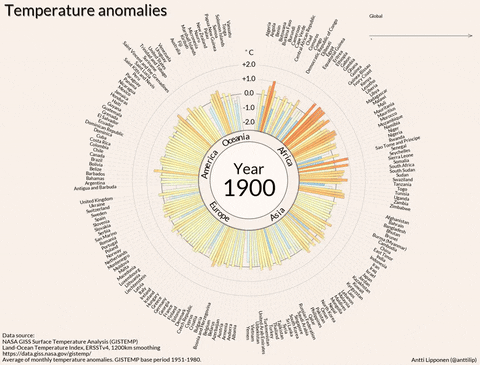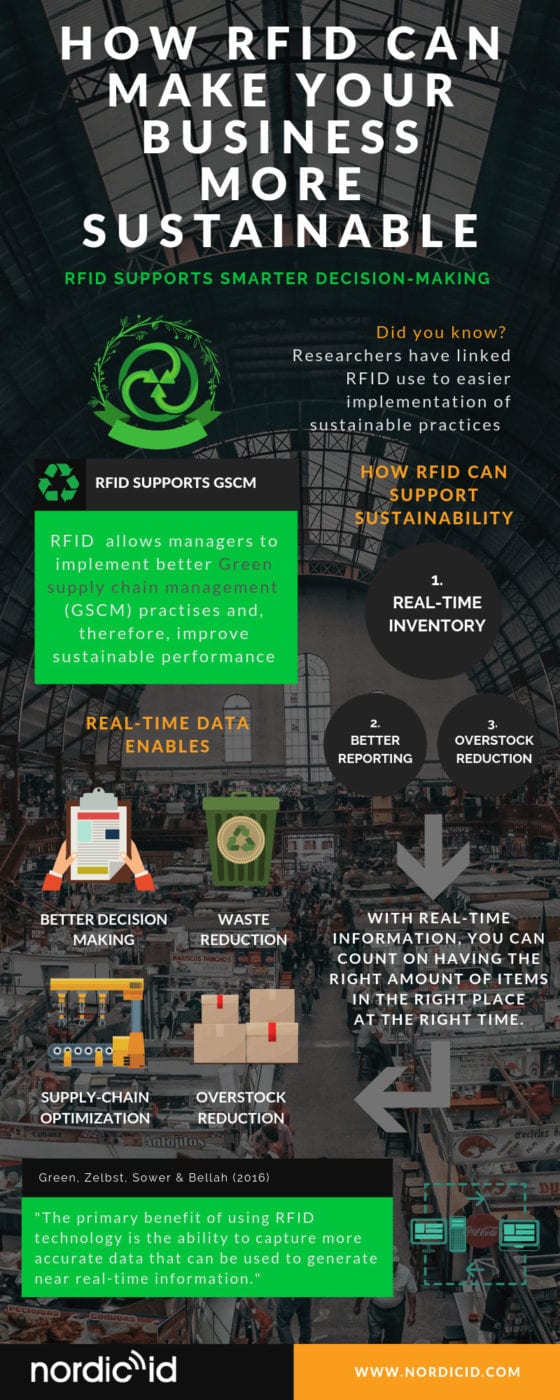why sustainability matters
We need to talk about RFID and Sustainability. As we are growing aware of the risks of global warming and the environmental impacts of industrialization, we are all united in the desire to keep our planet alive and well, not only for us but for future generations as well.
The IPCC Fifth Assessment Report, published in October 2018, called on governments to act, announcing that there are only 12 years left to limit global warming to 1.5C, as anything above this threshold will be a disaster for millions of people worldwide.

Global warming is a complex phenomenon, but scientists agree on its negative effects on the world’s population and environment, and the connection between carbon dioxide and other greenhouse gas emissions and the rise of global temperature has been proven beyond dispute. It is not surprising that governments and organizations worldwide have been working on reducing carbon emissions, with cities leading the way. So, if your company wants to be more sustainable and contribute to the fight against climate change, how can RFID help?
How RFID can support your sustainability efforts
RFID can support Green supply chain management practices
“Companies that implement GSCM practices benefitted from cost savings (conserving materials, reduced energy and water use), better public image and decreased environmental liability” Chin, Thoo & Sulaiman, Zuraidah & Huam, Tat & Norfatin Liana Muhamad Zainon, Siti. (2015)
The main way RFID can advance environmental sustainability is due to its potential to support and enhance Green supply chain management practices. GSCM aims at reducing waste, emissions, and energy use through the whole supply chain, and has been implemented to respond to pressure from both governments and customers, asking for more stringent environmental commitments. The desire to address the waste of resources and overproduction is at the core of Nordic ID’s philosophy and the main motivation behind The Right Amount Tour.

“Companies have to react to changes in consumer behavior and to individuals’ increasing awareness of the state of the environment, because it correlates directly with their business.”
Juha Reima, CEO, Nordic ID
If you can count on having the right amount of products at the right time in the right place, you can reduce the waste of natural resources and minimize the environmental impact of your business.This is especially true in the retail world, with overproduction and clothing textile waste being increasingly seen by consumers as failures we cannot afford. For example, Burberry announced their decision to stop burning unsold items, and start instead to reuse, repair, donate or recycle all unsaleable products. Even online retailer giants like Asos have started to address the financial and environmental costs of returns and excess inventory, which are responsible for 4 billion pounds of landfill waste every year. Moreover, the benefits of implementing GSCM are clear, with research linking better environmental performance to significant stock price increase [1]. In addition to this, GSCM implementation has been proven to positively impact environmental, economic, operational, and organizational performance [2] and RFID has a similarly positive effect on operational and organizational performance [3].
The main benefits of RFID
“…the benefits of using RFID technology should allow managers to better implement GSCM practices, which should also lead to improved environmental performance” Green, Zelbst, Sower & Bellah (2016)
The biggest advantage of relying on RFID-powered systems is real-time information: an RFID-based system transmits information embedded in a tag to a reader via radio waves and from there to an online database. This makes the flow of information faster and more reliable, making it the choice de rigueur for manufacturers and asset pooling companies. Supply chains are complex ecosystems, and it is not surprising that access to accurate, real-time data is one of the key requirements to implement successful sustainability policies.
RFID can help businesses reduce:
![]() Inventory stocking levels
Inventory stocking levels
![]() Out of stock items
Out of stock items
![]() Transportation, and related CO2 emissions
Transportation, and related CO2 emissions
It can also optimize:
![]() Use of storage space
Use of storage space
![]() Customer satisfaction
Customer satisfaction
![]() The sales cycle, with faster invoicing
The sales cycle, with faster invoicing
More accurate and faster access to information also results in:
![]() Optimization of internal processes and systems
Optimization of internal processes and systems
![]() Improved KPIs and reporting, to be shared with customers and shareholders
Improved KPIs and reporting, to be shared with customers and shareholders
![]() Identification of opportunities for reuse, recycle and waste reduction
Identification of opportunities for reuse, recycle and waste reduction
![]() A complete overview of the item flow and supply chain lifecycle, also for upstream and downstream
A complete overview of the item flow and supply chain lifecycle, also for upstream and downstream
Consequently, implementing RFID results in both direct and indirect improvements in sustainable performance. On the one hand, the reduction of overstock and needless transportation results in a very tangible reduction of carbon emissions and the optimization of resources. On the other hand, access to real-time information means that organizations can assess their internal processes and supply chain flow with higher accuracy and optimize both by relying on hard, real-time data.
RFID’s use is growing worldwide, with growth in adaption among new retailers in the US of 32% from 2015 to 2016 and plans for most big retailers to move towards 100% coverage. As the industry grows, the demand for sustainable practices and solutions intent on delivering advanced reporting capability and real-time inventory grows as well.
How can we help?
Nordic ID is the world’s leader in RFID solutions and devices. We are supporting businesses to make more sustainable decisions from one of the greenest countries on Earth. Whether you are interested in real-time inventory, automated solutions for better customer experience, or accurate visibility of your material flow, we would be happy to talk to you.
We want to support a more sustainable future with retail and industrial solutions that target real business concerns. We also help businesses optimize their resources, reduce waste, and have the tools needed to make better-informed decisions. Thanks to real-time data and a complete asset overview over the whole life-cycle, you will able to make smarter decisions and optimize the entire supply chain.
RFID & Sustainability Infographic
Want to share some of the key facts from this article? Download our infographic!

Sources
[1] G. Flammer, Corporate Social Responsibility, and Shareholder Reaction: The Environmental Awareness of Investors. Academy of Management Journal, 56(2013) 758-781. [2] Chin, Thoo & Sulaiman, Zuraidah & Huam, Tat & Norfatin Liana Muhamad Zainon, Siti. (2015). “Green Supply Chain Management Practices and Sustainability Performance”. Advanced Science Letters. [3] Zelbst PJ, Green Jr., KW, VE Sower, Reyes P. 2012. Impact of RFID utilization on manufacturing effectiveness and efficiency. Int J Oper Prod Manage,32(3):329–350. [4] Kenneth W. Green Jr., Pamela J. Zelbst, Victor E. Sower & Jeremy C. Bellah (2016): Impact of Radio Frequency Identification Technology on Environmental Sustainability, Journal of Computer Information Systems. [5] 2016 State of RFID Adoption Among U.S. Apparel Retailers Bill C. Hardgrave, Justin Patton. Auburn University, RFID Lab.